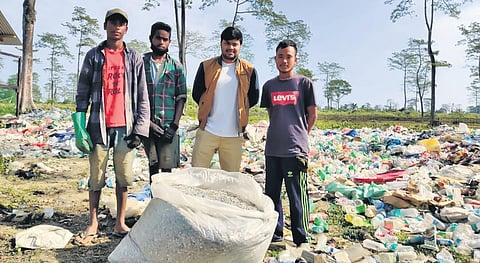

ARUNACHAL PRADESH: A militancy hotbed, Arunachal Pradesh’s Changlang district is often in the news for frequent insurgency incidents – ultras carrying out subversive activities such as extortion, abduction, and killings before fleeing to their hideouts in Myanmar.
The ‘spillover activities’ have kept the southeastern district troubled over the years, eating up its rural economy. Two years ago, an AIIMS doctor-turned-IAS officer rolled out a small initiative that has almost turned its economy around.
In 2019, district magistrate Devansh Yadav set up a plastic-shredding unit at Kumung Pathar panchayat, largely dominated by adivasis (tea tribe). The unit shreds single-use plastic for road-laying work. Roads constructed from the mixture of bitumen and the plastic can prevent water seepage and ensure better durability.
“Plastic waste is used in road construction. I thought since so much road construction work going on in and around Arunachal, why not use non-recyclable plastic. Within a year or so, we set up the plastic-waste processing unit. It got shortlisted in the top six projects for innovation under the Prime Minister’s Awards, 2020. However, it didn’t make it to top three,” Yadav tells this newspaper.
Located centrally, Kumung Pathar’s vicinity to a national highway made it the first choice for the unit. The area, Yadav says, didn’t have a dumping ground and locals would dump garbage in the streams that would often lead to flooding in areas bordering Assam. “So, we held meetings with villagers and the local panchayat interim committee. We tried to convince them that if they donate their land for waste dumping, they will not only earn revenue from it but local residents could also get employment. Once the project started, they gained confidence and started cooperating,” Yadav says.
So far, Rs 2.75 lakh revenue has been generated from the sale of over 10 metric tonne (one metric tonne is sold for Rs 25,000) of shredded plastic.
“Recently, we sold two metric tonne waste to a company constructing the Changlang-Tirap Highway. We have received another order for 10 metric tonne for the Longding-Kanubari Road,” the Changlang DM says.
The unit, which has three shredding machines, was set up with funds received from oil exploration major, the Oil India Limited (OIL), under its corporate social responsibility (CSR). The plastic waste is transported to the unit from urban areas of neighbouring districts of Lohit, Namsai, Tirap, besides Changlang.
The four districts have at least five women self-help groups (SHGs), with 10-12 members each. Changlang has around 10 SHGs. The project has not only eased the burden of disposing of the plastic waste but also enriched the coffers of Kumung Pathar Village Council, which manages the unit, as it gets the proceeds generated from the sale of shredded waste to road construction companies. The amount is used by the village council on community assets.
Various SHGs, tasked to segregate non-recyclable plastic waste, also earn from the Extended Producer Responsibility (EPR) funds of waste-purchasing companies. These SHGs work in coordination with the District Urban Development Agency (DUDA), which facilitates the transportation of waste with the help of EPR funds. The shredding is done by three local residents of Kumung Pathar and each of them gets Rs 5,000 a month.
“At the time of the unit’s installation, funds were received from the OIL. Thereafter, we are using EPR funds of companies to pay the unit’s workers and the members of SHGs. So far, Rs 4.68 lakh has been received under EPR. A start-up, Recykal Limited, channelises the EPR funds for waste management. It gives us money periodically for waste segregation and transportation,” Yadav says. An Additional DM oversees the project at the village level, while Yadav does so at the district level. Bijoy Purty, chieftain of Kumung Pathar, says: “We will build roads and community halls and repair schools with the money that we are earning.”
Profit from waste
Recycling and reuse of plastic has incentivized waste segregation in district urban development agencies of Lohit, Namsai, Tirap, Changlang districts.
The Kumung Pathar Village Council started repairing village approach roads using revenues earned. It intends to use future revenues to address local development needs such as repair of schools, installation of solar lights, etc.
1 kg of bitumen costs Rs 38. Shredded plastic costs Rs 25. Money saved per km in road construction is around Rs 5,700.
High strength and stability of plastic roads will lead to low maintenance costs in heavy-rainfall areas of
the state.